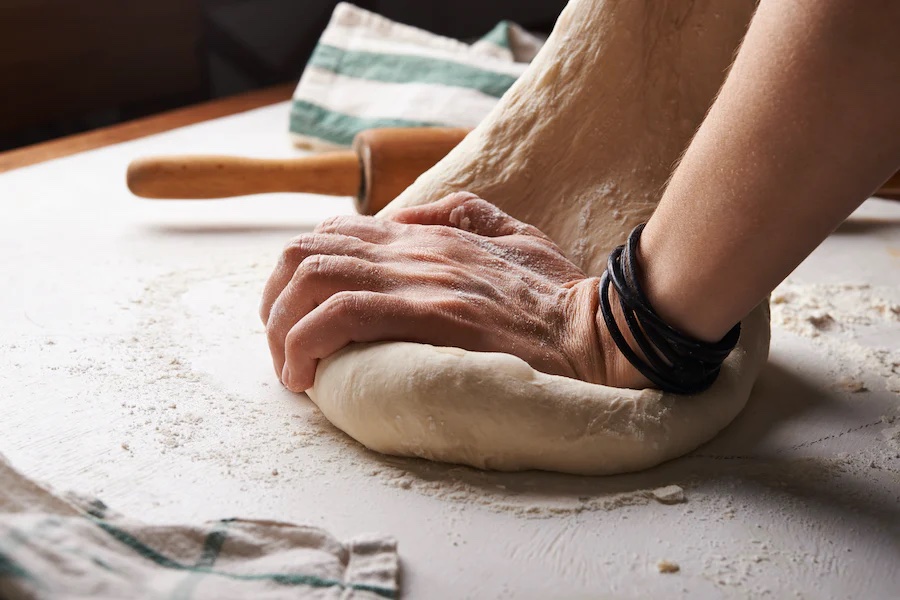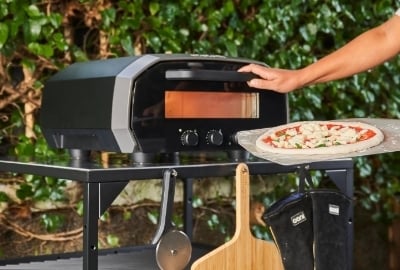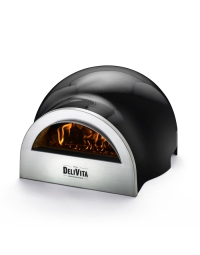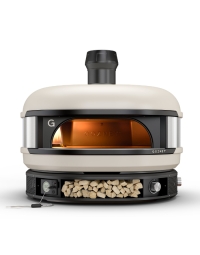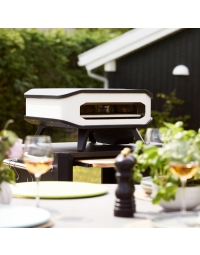Making a homemade pizza from scratch is delicious & easy if you have all the necessary tools for the job. A pizza oven and the flour required for the pizza dough are two essentials so StovesAreUs & Eurostar Commodities who supply premium-grade pizza flour have decided to collaborate to help more consumers in the UK enjoy the pizza-making experience.
Flour is the cornerstone of what makes the very best pizza dough and there are a variety of flour types to choose from. Eurostar Commodities have you covered when it comes to premium Neapolitan 00 pizza flour, their range includes top flour brands like Grandi Molini Italiani & Della Terra as well as yeast and gluten-free pizza flour. If you’re interested in knowing how to make Italian-style pizza dough and want to find out the differences between the best pizza flour, keep reading as which flour you choose could impact how your pizza turns out in your pizza oven.
Contents
How StovesAreUs & Eurostar Commodities Have Collaborated
Understand the Different Types of Flour
What Flour is Best for Pizza Dough?
6 Tips for Making Pizza Dough Like a Pro
Don't Forget About Gluten-Free Options
Interested in Attending a Pizza Making Masterclass?
Is a Pizza Oven Worth it?
How StovesAreUs & Eurostar Commodities Have Collaborated
If you’re in the market for your very own pizza oven then there hasn’t been a better time to buy one! West Yorkshire-based companies StovesAreUs & Eurostar Commodities are giving away a free bag of premium-grade Italian pizza flour when you purchase a pizza oven from StovesAreUs.co.uk. This giveaway includes Frumenta Italian wheat pizza flour, specially designed for producing homemade pizzas! This flour is from Grandi Molini Italiani, one of Italy's largest and most respected flour mills and is ideal for also making ciabatta and focaccia bread.
The gifting doesn’t stop here! Once you’ve tried out this great pizza flour we hope you’ll be keen to experiment and further refine your pizza-making skills. You can get 15% off selected pizza flour at store.eurostarfoods.co.uk so join the ever-growing pizza-making community and buy premium flour for your pizza dough today!
Understand the Different Types of Flour
If you're looking to make the perfect homemade pizza dough, the key factors to consider are the type of flour you use and the dough proving times. The right type of flour can make all the difference in achieving that light, crispy and golden crust that pizza lovers crave. Here we'll explore the different types of flour and provide expert tips on selecting the best flour for making pizza dough.
Before you can select the best flour for your homemade pizza dough, it's important to understand the different types of flour available, so here we go!
- 00 Flour - This is the most premium type of flour used for pizza dough. 00 flour is very finely milled and is well-known for making first-class Neapolitan-style pizza with an extra puffy crust. You’ll find 00 flour typically has a protein content of 12% to 14% which is considered to be medium to high. When using 00 flour we recommend using a wood-fired pizza oven as the dough responds best to high temperatures when cooking. Be prepared to wait between one to three days for the proving of the dough unless you’re using instant dry yeasts.
- 0 Flour - Type 0 flour makes a light and easily digestible pizza. Suitable for both deep dish and thin crust pizzas. Type 0 flour typically has between 8-12% protein, this versatile flour is also great for creating ciabatta and focaccia breads. When using 0 flour we recommend cooking it in a wood-fired pizza oven after proving the dough for up to 24 hours.
- Plain Flour - We don’t really recommend the use of plain flour for making pizza dough, this flour has much better results when baking buns or cakes. A low protein content of 9% means you won’t need long proving times but you’ll also be left with a very crispy pizza base that has limited flavours. Plain flour will do an adequate job of making pizza dough pretty quickly but don’t expect amazing results.
- Strong White Flour - A versatile option that works well for lots of pizza dough recipes. Strong white flour is a go-to option for baking bread and the most popular choice for making pizza at home. The protein content in strong white flour sits at around 12% protein with proving times typically sitting at 24 hours at room temperature. Very strong white flour is also available which has a slightly higher 14% protein content and will take slightly longer to prove. Strong white flour provides a really rich flavour and you can make a fantastic New York-style pizza with this dough.
- Wholemeal Flour - If you're looking for a healthier dough recipe then wholemeal flour might work for you. This high-fibre flour has a similar protein content to strong white flour at around 12%, so a proving time of around 24 hours at room temperature will suffice. To avoid very dense and heavy crusts we recommend blending wholemeal flour with strong white flour to improve the texture of your pizza crust and base.
Hopefully, the information we’ve provided above has given you some understanding of the characteristics of the different types of flour and can help you choose one that will provide you with the best homemade pizza. To summarise, 00 flour is much better at producing light and chewy pizzas whereas a strong white flour is more suited to deeper and robust New York-style pizza.
What Flour is Best for Pizza Dough?
Type ‘0’ and ‘00’ Italian pizza flours are certainly the most popular choices amongst pizza chefs.
Typically, finely ground Italian ‘00’ flour tends to be higher in protein and is ideal for classic Neapolitan thin crust style pizzas with a golden puffy crust. This flour offers an easily digestible base due to its soft wheat content. Proving the dough can take up to 48 hours. Once made the dough can usually be stored in the fridge for up to 3 days.
Type ‘0’ Italian wheat flour is also a fantastic choice and can be used for both deep pan and light and crispy pizzas alike. Great for producing homemade pizzas. This versatile flour can also be used for making ciabatta and focaccia bread. Proving of the dough can take up to 24 hours and once made the dough can stay in the fridge for up to 2 days.
Eurostar Commodities have a great range of Italian pizza flours available, including dry yeast and pizza ready sauce, all the key ingredients you need to make a truly authentic Italian style pizza. Whether you are in the catering industry or simply enjoy making pizzas in the comfort of your own home Eurostar have you covered. There is even a range of Gluten-free pizza flour options available.
6 Tips for Making Pizza Dough Like a Pro
Usually, 500g of '00' flour, 1 tsp salt, ½ tsp dried yeast (not fast-action) and 350ml warm water should be enough ingredients to make four 12" pizzas.
- Start with flour - Add all the dried ingredients to your mixing bowl, except salt. Then add 80% of the water, add your salt and begin to mix these ingredients together. Add the remaining 20% water gradually and the dough should begin to form, it shouldn’t be too wet or too dry. Using water at the correct temperature improves the dough significantly, but a simple rule of thumb is – If the air temperature is high, use cold water. If the air temperature is cool, use slightly warm water.
- Knead your dough - Kneading your dough is what develops the strong gluten that holds your dough together. Using wet hands to knead your dough is often the best practice. If you prefer to use a stand mixer (like a KitchenAid) make sure you set a timer to prevent the dough from becoming overworked.
- Don’t over-salt - Many pizza dough recipes will ask for you to dissolve the salt and yeast in the water, but did you know that salt can kill yeast and ultimately stop the dough from rising? Ensure you measure the salt content carefully and don’t use more than you need.
- The poke test - If you’ve ever wondered when to finish kneading the poke test is a great way to check if it is ready. When you feel your dough is close to ready it should be fairly smooth and not too sticky. If you give your dough a poke in the middle you should see that it bounces back. If your dough bounces back into shape then the gluten has become strong enough and your dough is now ready for proving. We recommend applying a little olive oil to the finished dough as this will help make your pizza base super crispy.
- Use the correct equipment - Once prepared, your dough will need cutting and shaping into dough balls of around 250g (for a 12-inch pizza). A dough scraper is handy for separating the dough without stretching or ripping it needlessly.
- Experiment with flour - Using different types of flour can make a real difference to your pizza base. Flours which are naturally higher in gluten may give you a better rise than flours with a lower gluten or protein content.
Don't Forget About Gluten-Free Options
If you or someone in your household has a gluten intolerance or allergy, don't worry - you can still enjoy delicious homemade pizza! There are plenty of gluten-free flour options available that can be used to make a tasty gluten-free pizza dough. Look for flours made from alternative grains like rice, almond, or chickpea flour. These flours will give your dough a slightly different texture and taste, but with the right recipe and technique, you can still achieve a crispy, chewy crust that rivals traditional pizza. So don't forget to consider gluten-free options when selecting the best flour for your homemade pizza dough.
If you’re interested in learning more about how to make gluten-free pizza and breads there are some game-changing recipes you have to know! The recipes below will bring your gluten-free household all the joys that a traditional Neapolitan-style pizza should!
Interested in Attending a Pizza Making Masterclass?
Eurostar Commodities have opened their very own pizza cook school! This pizza academy of excellence is now open and is showcasing the very best of Grandi Molini Italiani Premium Italian pizza and Pinsa flours.
The classes are available to professional chefs, catering schools, restaurants, wholesale & retailers. The Masterclass will cover working with high-hydration pizza, contemporary and Neapolitan styles, and new trends in pizza-making including Pinsa Romana. Spaces are filling quickly so contact Eurostar Commodities now if you’re interested in taking part.
Contact - [email protected] or call 01422 320516
Is a Pizza Oven Worth it?
Yes, absolutely yes! Pizza ovens are designed to reach temperatures nearly double that of a conventional kitchen oven or range cooker. The high heat seals in the flavour of the toppings and helps you achieve an extra-crispy crust.
If you're in the market for a pizza oven then there are three main fuel types; wood, gas & electric, with various options for your garden such as the very popular masonry pizza ovens and for the ultimate in practical pizza making there are even portable pizza oven options. Each fuel type has its own pros and cons but if you're wanting perfectly made pizza then a pizza oven is an absolute must.



